
Fluorite mineral is one of common non-metal minerals, which is also called CaF2. Fluorite mineral has rich colors. It is important fluoride minerals for the industry. Fluorite mineral common grows with calcite, dolomite, quartz, barite, pyrite, galena, blende and so on. Fluorite mineral has similar characteristics with calcite, barite and other common gangue minerals. It is difficult to separate them with flotation. In thesis, we will sketch the processing technology of separating fluorite mineral with calcite, barite, quartz, and sulfide minerals.

Calcite and fluorite mineral can both be collected by fatty acid collectors and are both calcium minerals. It is difficult to separate them. For the flotation separation of fluorite mineral and calcite, the key point is to enlarge the flotation difference at suitable grinding fineness.
Under the alkaline condition, calcite is easy to be floated. But under acid condition, the flotation condition of calcite reduced a lot. However, fluorite mineral has a similar flotation condition under both acid and alkaline conditions. Therefore, pH value can be controlled to increase the flotation condition of the two minerals. According to the mineral processing experiment, the concentrating cells should control the pH value between 6.4-6.8.

Basic on pH value, we can use calcite inhibitor to increase the flotation condition difference between the two minerals. The common reagent combinations are as follows:
1. Dextrin or tannin extracts were used as calcite inhibitors, and oxidized paraffin soap was used as fluorite mineral collector.
2. Acid sodium silicate was used as calcite inhibitor and fatty acid as collector flotation.
3. Sodium silicate, caustic starch and sodium hexametaphosphate were used as mixed inhibitors, saponified oleic acid was used as a collector for rough selection, and sodium silicate and citric acid were selected as mixed inhibitors.
Actually, there are a lot of choices of reagent combinations. In general, inhibitor, collector and other reagent regimes should be decided through mineral processing experiments according to the component and characteristic of ores.
The separation theory of fluorite mineral and barite is similar to the flotation separation of fluorite mineral and calcite. The main component of barite is BaSO4, which has larger differences with fluorite mineral. Among the factors influencing the flotation separation of these two minerals, different regimes of reagent have different requirements of pH value. Therefore, every regime of reagent has a suitable pH value scope.

Such as when barium sulfate was used as an inhibitor and the pH value was maintained at around 5.9, the recovery rate of fluorite mineral was much higher than that of barite. Under these conditions, a combination of naphthenic acid as a collector can be used to separate fluorite mineral and barite.
Besides, the regimes of reagent can be used for the separation of fluorite mineral and barite include:
1. Sodium sulfate and caustic starch were used as mixed inhibitors, tf2-8 was used as the collector, and the pH value was about 8.5 to inhibit barite.
2. Fluorite mineral and barite were separated by selectively oxidized paraffin soap and nitroalkyl propylenediamine as a mixed collector. The selection of various combinations of agents is more, need to carry out mineral processing test, according to different minerals to choose the appropriate process and agent system.
Totally, for the processing technology of barite and fluorite mineral separation, we can choose differential flotation solution (inhibiting barite and float fluorite mineral); we can also use flotation of barite followed by flotation of fluorite mineral or mixed flotation - separation scheme.
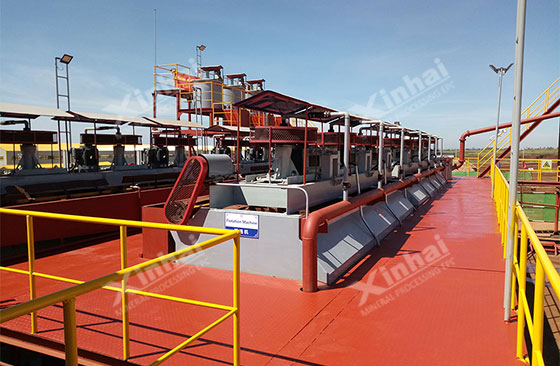
It is worth to mention that, there are two methods separating mixed concentrations. Firstly, lignin sulfonate, sodium fluoride, sodium silicate, aluminum salt, iron salt and dextrin inhibit barite and other minerals, and fluorite mineral is flotation with oleic acid. The second is to flotation barite with hydrocarbyl sulfate, and fluorite mineral remains in the tank.
Fluorite mineral commonly grows with quartz. The quartz component of fluorite mineral concentrate differs from different production classes, which can be divided into three classes, metallurgical-grade, ceramic grade, and acid grade. The quartz requirement of acid grade fluorite mineral is higher.
If we want to separate fluorite mineral and quartz as much as possible, we need to decide a suitable grinding fineness, till monomer separation of fluorite mineral and quartz through grinding. During this period, if the fineness is coarse, the production still contains the aggregate of fluorite mineral and quartz and higher silica content coarse concentrate. If grinding fineness is too fine, fluorite mineral over crushing is hard to recycle. In order to separate fluorite mineral and quartz monomer and recover fluorite mineral effectively, a stage grinding - stage flotation process can be used for separation.
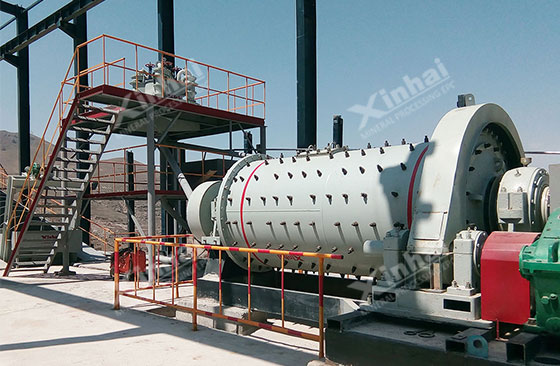
If the concentrate yield of small-scale mines is small and it is not suitable to grind it again, the method of rod grinding can be adopted to treat it. The fineness of the rod mill is even, which effectively reduces the occurrence of over-crushing and significantly reduces the silicon content of fluorite mineral concentrate.
For the flotation separation of fluorite mineral and quartz, the pH value can be controlled between 8-9 by Na2CO3. Water glass inhibits quartz, but need to control the amount of water glass, too much will inhibit fluorite mineral. In order to improve the selectivity and inhibition of sodium silicate, some iron salt and aluminum salt were added, and then fluorite mineral was flotation by fatty acid collector.
For fluorite mineral containing sulfide ore, sulfide is usually flotation by adding xanthate collector and fluorite is flotation by fatty acid collector. If the sulfide is not exhausted, a small amount of sulfide inhibitor can be added in the flotation of fluorite mineral to prevent the residual sulfide from being collected into fluorite concentrate.
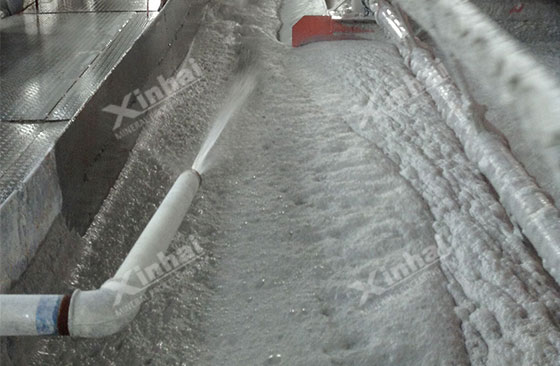
Above is the common solution of fluorite mineral and common gangue minerals. During the flotation of fluorite mineral, the regime of reagent and grinding fineness are important factors influencing fluorite mineral flotation, which can’t be decided blindly. It is suggested that carryingmineral processing experiment with qualified ore dressing laboratory or ore dressing equipment supplier. To avoid economic loss, technological processes and chemical systems are determined according to ore properties.

Inner Mongolia 700tpd fluorite mineral processing project
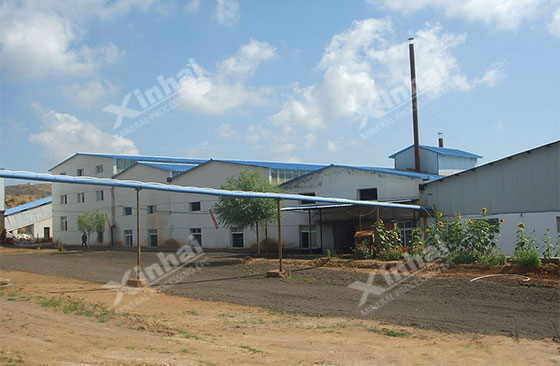
Ore Characteristic: The ore is main with fluorite mineral and fluorite - quartz ore, which has a simple mineral component. The component is main fluorite mineral, quartz, calcite and so on.
Xinhai Solution: Two stages and one closed circuit crushing screening - a closed circuit grinding classification - a coarse and a scavenging seven concentrating flotation process - concentrate thickening, filtration dewatering – tailings dry stacking process.
Project Result: Finally the recovery rate of fluorite mineral is up to 83.13%. The concentrate grade is up to 97.78%. It provides about 65,000 tons of fluorite powder to society every year. After the implementation of the project, it solves the problem of local employment, shares some employment pressure with the society, and generates good economic and social benefits.
Inner Mongolia 600tpd fluorite mineral processing project
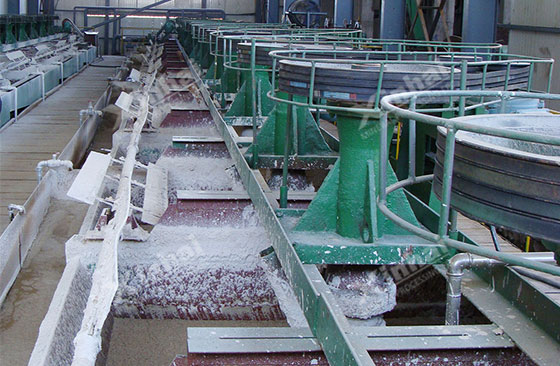
Ore Characteristic: The main gangue minerals are quartz, calcite, dolomite and so on. Fluorite mineral is the only recyclable mineral.
Xinhai Solution: Two stages of a closed-circuit crushing screening - a section of closed-circuit grinding with control grading (a section of grinding, two stages of classifying) - desulphurization flotation - fluorite flotation (a coarse two scavenging eight concentrating, select I concentrate closed grinding) - concentrate dewatering process.
Project Result:
In line with the principle of "energy saving, consumption reduction and high-efficiency recovery", Xinhai Mining adopts reliable technology, practical, simple and economic technological process for the fluorite mineral processing project, and provides a series of processing equipment with simple operation, convenient maintenance and high efficiency and energy saving. Through reasonable design, on the premise of ensuring the construction quality, Xinhai Mining can save capital construction investment as much as possible, reduce the land occupation, improve the utilization rate of mineral resources, and reduce the consumption of water and electricity resources, thus laying a good foundation for the subsequent operation of the dressing plant.
To find out more about our products and solutions, please fill out the form below and one of our experts will get back to you shortly.